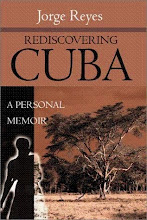Political changes in Raul Castro's Cuba
By Jorge Reyes
This past Sunday, Cuba's Raul Castro announced that he will step down as Cuba's president in 2018 following a final five-year term. For the first time in many years, decades, many can finally put a date to the end of the Castro's dynasty. For heir apparent, Castro seems to have chosen a rising star within the communist conglomerate, a Miguel Diaz-Canel.
With his announcement, the aging Castro, now 81 years old, he is hoping to establish two-term limits and age caps for political offices, including the presidency, for all future elections. This, as everyone knows, is an astonishing speech. Both Castro brothers have led the Cuban nation since 1959, before I was born.
Very little is known outside the Cuban circles of luminaires about Diaz-Canel, 52 years old. What is remarkable that this almost unknown figure has risen higher than any other Cuban official. In fact, he is a product of the 1959 Cuban Revolution and was not one of the original participants of the revolutionary force that toppled the much despised dictator of Fulgencio Batista.
Castro's speech lasted 35 minutes. In it, Castro hinted at various other reforms, changes in the constitution, and also hinted that no revolutionary leader ought to abandon socialism, saying he had not assumed the presidency in order to destroy Cuba's system. As he said, “I was not chosen to be president to restore capitalism to Cuba. I was elected to defend, maintain and continue to perfect socialism, not destroy it."
He continued to say that this moment was of "historic transcendence."
Castro praised Machado Ventura and another aging revolutionary for offering to leave their positions so that younger leaders could move up.
Their selflessness is "a concrete demonstration of their genuine revolutionary fiber … That is the essence of the founding generation of this revolution."
Castro said that Diaz-Canel's promotion "represents a definitive step in the configuration of the future leadership of the nation through the gradual and orderly transfer of key roles to new generations."
"Our greatest satisfaction is the tranquility and serene confidence we feel as we deliver to the new generations the responsibility to continue building socialism," he added.
On the streets of Havana, I am not sure how people reacted to this news. In the streets of Miami, however, the announcement was taken with a grain of salt.
It goes without saying that since 2006 when the elder Fidel retired and Raul took over the presidency, the younger Castro has instituted a slate of important economic and social changes, expanding private enterprise, legalizing sales of homes and relaxing travel restrictions. As he alluded in this speech, though, the country remains ruled by a one-party communist Party ideology and any opposition to it lacks legal recognition.
Castro has mentioned term limits before, but he has never said specifically when he would step down, and the concept has yet to be codified into Cuban law. It remains to be seen how this will pan out in the future. But if Castro is true to his word, he will leave office in 2018.
Cuban-American in the United States and the world all over, have waited for decades for the end of the Castro era. I was born at a time when the Cuban revolution was at its hysterical worst, the 1970's. I can still recall how my grandparents awaited with open arms for an end to the political system that systematically destroyed their way of life. My grandfather, particularly, couldn't resist the temptation to tell anyone who'd listen that then elected Ronald Reagan would be the savior of the Cuban cause. That didn't happen exactly as he had hoped. My grandfather died in 1981, still waiting for the freedom he had hoped would set his Cuba free. My grandmother died twenty years later, and by then she could care less.
Nevertheless, the promise of a change at the top could does have deep significance for U.S.-Cuba ties. The 51-year economic embargo against Cuba by Washington specifies that it cannot be lifted while a Castro family member is in charge.
And, so, for every Cuban watcher I know, the end to the Castro regime is coming to a close and the end may not be like the climatic uprising old-timers had hoped. In fact, from what I see, the island will continue on its path of slow changes and change at the top will occur with less gloom-and-doom scenarios and more like a structured change of power than previously expected, "communist style", of course, but transcendent nonetheless.





1 comment:
Los cambios en cuba seran incremental, nada de otra revolucion. Los disidentes tendran mas apertura y la sociedad cambiara, pero poco a poco.
Post a Comment